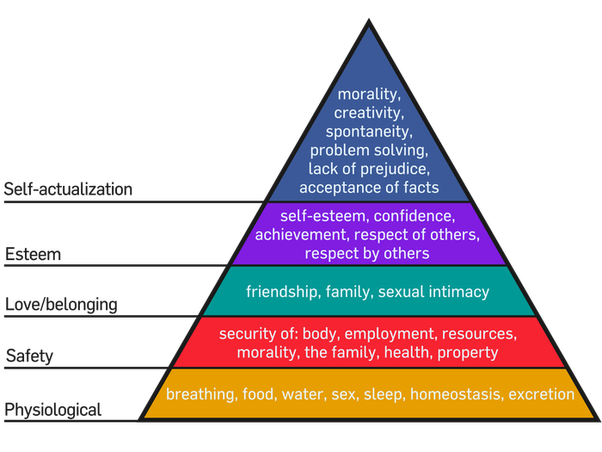You’ve probably heard of Maslow’s pyramid, right? It’s that drawing you see in textbooks explaining something about psychologic needs and that sort of crap. But what’s the connection between such theoretical gibberish and the real world?

I will keep this short, so bare with me. Maslow said that people have 5 levels of basic needs:
- Survival (air, water, food, and shelter)
- Safety (personal and financial security, health and well-being)
- Love/belonging (friendship, intimacy, family)
- Esteem(respect, social status, self-confidence, competence and mastery)
- Self-actualization (fulfillment of ideals, passions, hobbies and dreams)
According to Maslow, if you want to live a happy life you need to work your way up the pyramid. Like playing a videogame, you first tick off all the items in level 2 and then move on to level 3. This sounds like a nice little theory, but how do you use it in real life?
Making happiness real
Using the method is easy: just print a copy of Maslow’s pyramid and look at it every time you have to make a big decision. Then ask yourself: will this choice move me up or down the pyramid? (Yes, you can be relegated back to level 1. There is no saved game.)
For example, let’s say you want to take up a loan to buy a Ferrari. Will this make your life happier? Is it worth it? Well, look at the pyramid. A fancy car will probably raise your self-confidence and/or social status (level 4). It may even fulfill a dream (level 5). This is great, you’ve reached the top of the pyramid! But if the monthly cost is too high it will affect your financial security (level 2) and all the other things won’t matter. You will still end up miserable and regretful.
The same method can tell you if you should take that better paying, more stressful job. Just look at the pyramid. Is your financial and personal future (level 2) secured? Will the extra money enable you to pursue some elusive dream or expensive hobby (level 5), or will it make you spend more time away from your family and friends (back to level 3)? The answer is right in front of you.
I definitely agree, well said. So, what's wrong with our generation because I haven't seen You referring to that? You think people don't follow this advice or aren't aware of their needs or maybe something else?